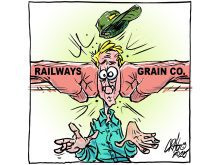LAWRENCE Martin readily admits he’s partly to blame.
As the author of a new biography on prime minister Jean Chrétien, Martin explains the lack of agricultural profile in the book in part by mentioning his own lack of knowledge about the sector.
“That was an issue I didn’t delve into because I frankly don’t have the background in it,” the author and political journalist said this week after the publication of Iron Man: The Defiant Reign of Jean Chrétien.
Perhaps more to the point, during his years of research and hundreds of hours of interviews with Chrétien and his confidants, Martin did not flag this as an issue that engaged the prime minister. “I never glimpsed a great leaning in that direction.”
Read Also

Surviving a bad harvest day sometimes requires a little luck
Producer and writer Kevin Hursh shares a day of three potentially disastrous incidents as cautionary tales of farm safety for Prairie farmers in the midst of fall harvest work.
So, on the 10th anniversary of Chrétien’s ascension to the office Nov. 4 and months if not weeks from his retirement, it is a fair question to ask: what vision did Canada’s 20th prime minister and fifth longest-serving first minister have for one of Canada’s largest economic sectors?
There are reasons he should have cared deeply and been intimate with the sector.
As a son of rural Quebec, he should have been familiar at least with the dairy industry, which does a thorough job of keeping Quebec MPs familiar with the sector. In fact, Chrétien often bragged that he was a proud member of the Liberal rural caucus.
And as a prime minister who was more trade obsessed than any predecessor, he should have been aware that agriculture is one of Canada’s export success stories and a multi-billion dollar contributor to Canada’s balance of payments.
In addition, he presided over some significant agricultural policy shifts during his decade of power.
It was the first Chrétien government that killed the Crow rate and slashed farm program funding from $850 million to $600 million. The first Chrétien government also signed a trade deal in 1994 that will ultimately spell the end of supply management.
It was the second Chrétien government that killed the dairy subsidy.
It was the third Chrétien government, and in fact the prime minister himself, who announced last year a $5.2 billion promise that would increase annual federal spending on the sector to $1.1 billion.
Yet it is difficult to remember a moment during the past decade when the prime minister actually showed a passion, or even a detailed knowledge, of the issues at stake.
On an eastern Ontario farm last year he read a text about the agricultural policy framework from a farm wagon but did he understand it?
He chatted with farmers during a visit to agriculture minister Lyle Vanclief’s farm last year but did he understand what they face?
Author Martin said the prime minister gave him no hint that agricultural policy and the fate of farm families was a particular passion for him. That was not surprising.
“Chrétien is first and foremost a political guy,” said Martin. “He is not a policy guy, a detail guy.”
Which probably means he paid most attention to the Quebec dairy industry in 1995 when the Quebec referendum campaign was under way and federalists were warning Quebec dairy farmers they could lose their access to Canada for their milk after separation.
That is the kind of argument and detail Jean Chrétien could understand.














